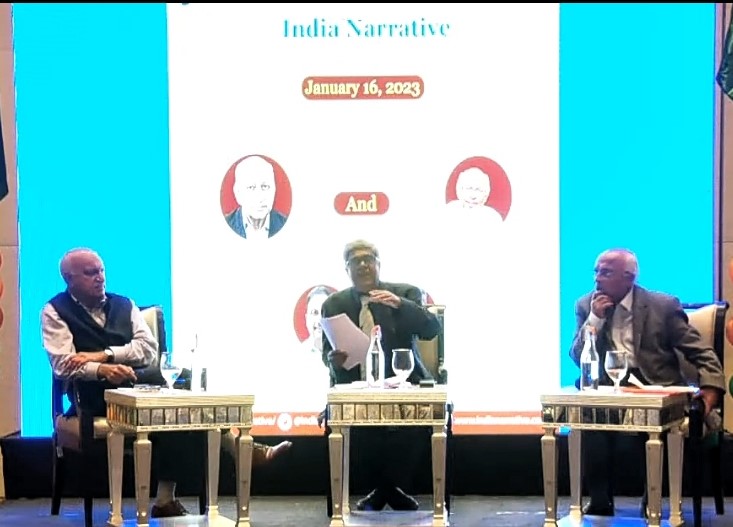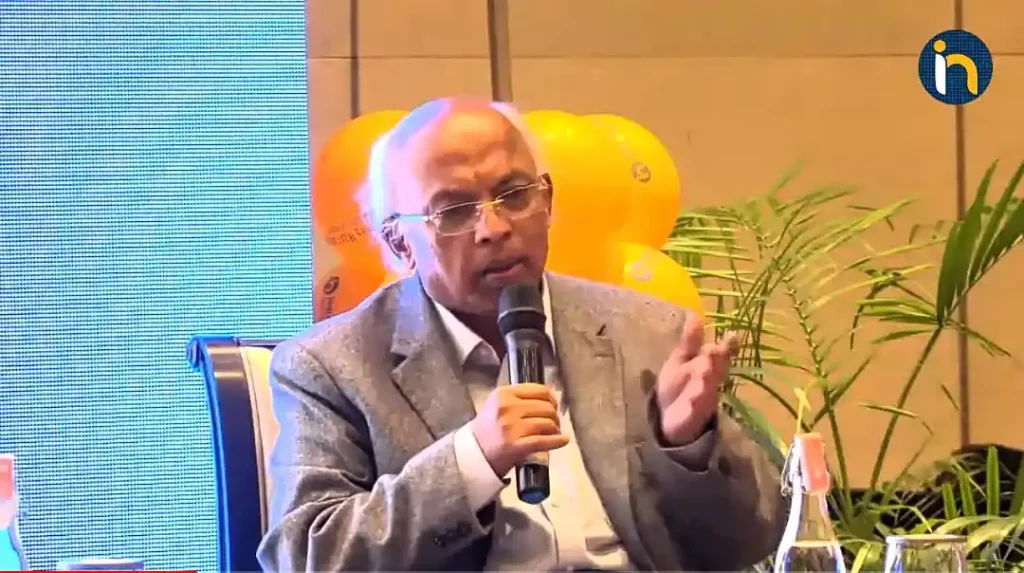

Bangladeshi journalist Syed Badrul Ahsan (right), SV Raman, former director, Goethe-Institute, Max Mueller Bhavan, Kolkata (centre) with former minister and author MJ Akbar (left)
Eminent Bangladeshi journalist and author Syed Badrul Ahsan, currently on a trip to India, said that Sheikh Hasina has provided a strong government that has restored secularism and democracy in the country.
Ahsan was in conversation with former minister and author MJ Akbar in Kolkata, where he had an interaction with local journalists and the intelligentsia. The two discussed relations between India, Bangladesh, Pakistan as well as historical events—Partition of India and the Bangladesh war of liberation.
Talking about India-Bangladesh relations, Ahsan said that when the BJP came to power, many believed that ties between the two countries would take a downturn. However, he said relations between the Awami League and the Modi government have been excellent. “Our relations with India are on an upward swing. India’s exports are $14 billion to us but ours are lesser”, Ahsan pointed out.


He said that the projects between Bangladesh and India are beneficial for the whole region and also bode well for other countries in the region. He emphasised upon encouraging people-to-people cooperation between Indians and Bangladeshis.
The Bangladeshi journalist said that his country is following an excellent foreign policy. Giving an example, he said that relations with Russia and China have been appreciable. “We have not tried to play off powers against each other. We cannot afford to do it as we are a small State. We have successfully staved off pressure from China. We do not have a Hambantota nor a Gwadar port. This shows that we make our own decisions”.
Akbar concurred with Ahsan about the warmth in Indo-Bangladesh relations. He said: “The two countries have good relations. A border problem which was frozen has been sorted out. Today, electricity is being supplied from our country to Bangladesh. The two countries are redefining the meaning of neighbours… I am not romanticising politics between the two”.
Akbar said the concept of neighbours should be defined by reach and connectivity. “We have a civilised border. It is not a frozen or a semi-frozen border. When you go to the border you see people crossing over. But when you go to the border at Attari you only feel silence”.
Ahsan dwelt on the frosty Bangladesh-Pakistan relations as well. He said that it has been the inability of successive Pakistan governments to come up with an apology for the 1971 genocide that has kept their relations in a deep freeze. He said that Pakistani leaders have not condemned its army’s genocidal actions in Bangladesh in 1971.
Giving an example, Ahsan said that the Pakistani Army museum in Rawalpindi has posters which say—‘Mukti Bahini committed genocide’ and ‘The first terrorist organisation was established by India. Its name is Mukti Bahini’.
Holding a comparison between Bangladesh and Pakistan, Akbar said: “…while Bangladesh is coming up on the horizon, the people of Pakistan are not happy”.
Akbar also felt that Bangladesh is becoming a modern society. He explained it through the endearing slogan of ‘Liberty, equality and fraternity’. Akbar added the word ‘modernity’ to it and said: “Modernity is the fourth element that has to be added now. To me modernity means democracy, gender emancipation, elimination of poverty, religion freedom. In all these parameters, Bangladesh is moving towards modernity. But I cannot say the same for Pakistan”.
Talking about the Bangladeshi Prime Minister, Ahsan said Hasina’s contribution to Bangladesh has been in restoring secularism while battling Islamist militancy supported by Pakistan. He highlighted two challenges before the Hasina regime—curbing Islamist militancy completely and nixing the idea that Islam should be made the State religion of Bangladesh.
The Bangladeshi journalist said that many people in his country feel that the Partition of India was a mistake and the Bengalis have suffered due to that.
Talking about Jinnah, he said that Pakistan’s founder was asked to take a flight on the border areas and see the consequences of Partition for himself. “Jinnah took a flight and saw thousands of people streaming into Pakistan and also out of Pakistan. Then he whispered to no one in particular, ‘what have I done’… This was reported to his wife along with the message that this incident should not be mentioned to anyone till Jinnah’s death. That was Jinnah’s realisation”, Ahsan said about the mistake of Partition.
Moderator of the session, SV Raman, former director, Goethe-Institute, Max Mueller Bhavan Kolkata agreed that the idea of Partition was not agreeable to all. He highlighted how the then Congress president, Maulana Abul Kalam Azad had opposed Partition and even pronounced that Pakistan would be a failed State. “The maulana had said that the two sides (East Pakistan and West Pakistan) do not have similarity in their language, culture and food habits. His stand was vindicated in 1971 when Bangladesh was created”, Raman said.
Also read: Bangladeshi journalist and author Syed Badrul Ahsan’s India tour begins in Kolkata today
Israel Defence Forces Spokesperson Brigadier General Effie Defrin on Thursday said that Iran has expressed…
India's Hindustan Aeronautics Limited (HAL) and French engine manufacturer, Safran Aircraft Engines, signed an agreement…
India has emerged as a country with the third-largest growth in power generation capacity globally…
Prime Minister Narendra Modi hailed Indian chess grandmaster Divya Deshmukh for defeating world number one…
The family of detained Baloch leader Mahrang Baloch has accused prison authorities at Quetta's Hudda…
The QS World University 2026 Rankings bring great news for our education sector, as the…